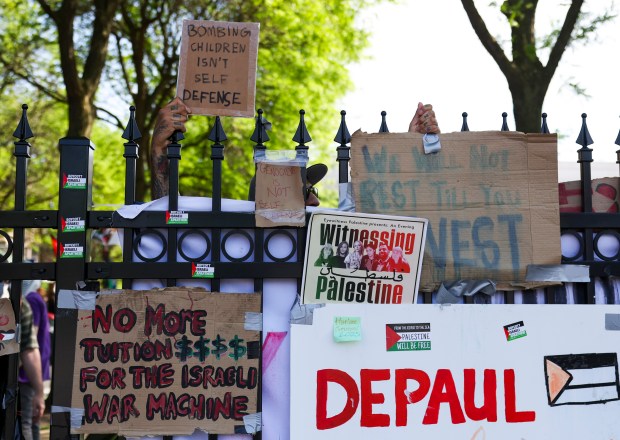DePaul University did a true public service by revealing the 1,000-plus complaints made by students, faculty members and neighbors against the unauthorized, anti-Israel tent encampment on its campus. Those complaints — counting actual death threats — included acts of antisemitism, harassment, intimidation and physical battery.
The people professing to be peaceful demonstrators had amassed weapons — knives and a pellet gun. And that’s just the weapons that were discovered. They surrounded the area with barricades reinforced by steel bars, wooden pallets and stolen grates, and ringed their perimeter with wooden boards studded with long nails.
This was all gathered over two weeks within an encampment whose very presence violated campus policies and caused 45 university events to be canceled. Students who had invested their hard-earned savings in tuition also had their classes canceled. The cost of property damage has been estimated at $180,000.
The weaponization and physical damage provide just a glimpse into the nature of many agitators who were there, how little they care about the community they inhabit, how hate-filled they are and the very real danger they posed to all — not just Jews.
The protesters’ vitriol was directed at anyone trying to walk by — Jewish or not. The entire residential neighborhood was subjected to the “free speech” of this rabid takeover. Terrifying imagery, accompanied by screaming, masked disruptors, was on full display for families walking their children to the park and Chicagoans walking to work or simply going about their daily lives.
For weeks, too many have dismissed the concerns that tent encampments on local campuses were dangerous hotbeds of antisemitism and hate.
Too many believed the protesters and their defenders who said authorities sought to stifle their free speech. What has now been revealed by DePaul University should be a wakeup call for everyone:
- One masked protester visibly celebrated — and promised a repeat of — the deadliest day for Jews since the Holocaust when he hand-signaled “10-7″ (October 7) and drew his finger across his neck, pantomiming slitting his throat.
- Taunts and antisemitic chants included “Go back to Poland” and “We are the intifada.”
- The encampment was festooned with signs proclaiming, “By any means necessary,” “Jewish safety cannot be achieved until Palestine is free,” “Long live the intifada” and even a Palestinian flag emblazoned with the image of a Hamas leader. It is no accident that no American flags were present.
- Protesters defied local ordinances, amplifying their hate-filled shouts with sound equipment, preventing DePaul students and the surrounding residential neighborhood from going to sleep.
- The university alerted students not to leave their dorms because the protesters had made the campus unsafe.
- Masked protesters encircled students on the quad, chanting antisemitic slurs, shoving them and preventing them from passing by.
- There were credible threats of violence serious enough that the neighboring Oscar Mayer Elementary School canceled recess and outdoor activities to protect their students.
The protesters’ readiness to resort to violence can no longer be denied. Or minimized. Or rationalized. Or accepted.
Elected officials, faculty and other public figures remained silent in the face of obvious hate. They blindly invoked and misapplied the protesters’ supposed right to free speech on private property.
The protesters exploited that “right” — and those leaders were complicit. However, they do possess their own right to free speech. Chicago’s Jewish community now calls on them to use it to denounce the threats to life and the crimes committed. To decry the militarization of the encampments. To condemn the antisemitism everyone saw and heard.
We are waiting for them to do the right thing.
Jay Tcath is executive vice president of the Jewish United Fund
Submit a letter, of no more than 400 words, to the editor here or email letters@chicagotribune.com.



